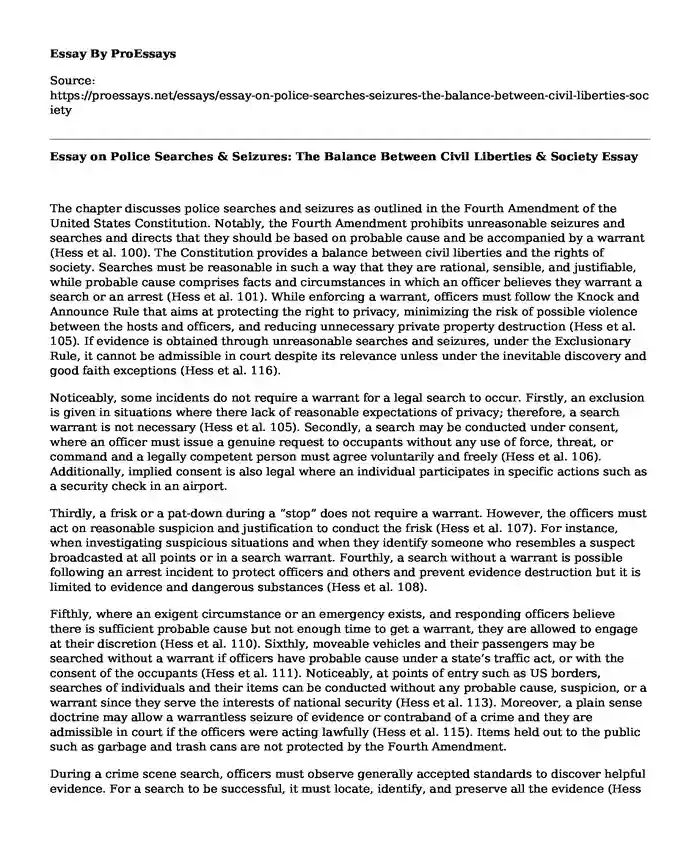The chapter discusses police searches and seizures as outlined in the Fourth Amendment of the United States Constitution. Notably, the Fourth Amendment prohibits unreasonable seizures and searches and directs that they should be based on probable cause and be accompanied by a warrant (Hess et al. 100). The Constitution provides a balance between civil liberties and the rights of society. Searches must be reasonable in such a way that they are rational, sensible, and justifiable, while probable cause comprises facts and circumstances in which an officer believes they warrant a search or an arrest (Hess et al. 101). While enforcing a warrant, officers must follow the Knock and Announce Rule that aims at protecting the right to privacy, minimizing the risk of possible violence between the hosts and officers, and reducing unnecessary private property destruction (Hess et al. 105). If evidence is obtained through unreasonable searches and seizures, under the Exclusionary Rule, it cannot be admissible in court despite its relevance unless under the inevitable discovery and good faith exceptions (Hess et al. 116).
Noticeably, some incidents do not require a warrant for a legal search to occur. Firstly, an exclusion is given in situations where there lack of reasonable expectations of privacy; therefore, a search warrant is not necessary (Hess et al. 105). Secondly, a search may be conducted under consent, where an officer must issue a genuine request to occupants without any use of force, threat, or command and a legally competent person must agree voluntarily and freely (Hess et al. 106). Additionally, implied consent is also legal where an individual participates in specific actions such as a security check in an airport.
Thirdly, a frisk or a pat-down during a “stop” does not require a warrant. However, the officers must act on reasonable suspicion and justification to conduct the frisk (Hess et al. 107). For instance, when investigating suspicious situations and when they identify someone who resembles a suspect broadcasted at all points or in a search warrant. Fourthly, a search without a warrant is possible following an arrest incident to protect officers and others and prevent evidence destruction but it is limited to evidence and dangerous substances (Hess et al. 108).
Fifthly, where an exigent circumstance or an emergency exists, and responding officers believe there is sufficient probable cause but not enough time to get a warrant, they are allowed to engage at their discretion (Hess et al. 110). Sixthly, moveable vehicles and their passengers may be searched without a warrant if officers have probable cause under a state’s traffic act, or with the consent of the occupants (Hess et al. 111). Noticeably, at points of entry such as US borders, searches of individuals and their items can be conducted without any probable cause, suspicion, or a warrant since they serve the interests of national security (Hess et al. 113). Moreover, a plain sense doctrine may allow a warrantless seizure of evidence or contraband of a crime and they are admissible in court if the officers were acting lawfully (Hess et al. 115). Items held out to the public such as garbage and trash cans are not protected by the Fourth Amendment.
During a crime scene search, officers must observe generally accepted standards to discover helpful evidence. For a search to be successful, it must locate, identify, and preserve all the evidence (Hess et al. 117). Officers may utilize search patterns such as naps lanes, strips, zones, or concentric circles (Hess et al. 118). Notably, in incidents when a suspect is arrested, a full body search for weapons and evidence may be conducted, while if not arrested, the search should be confined to a frisk or putdown for weapons. Notably, canines may be used to reinforce a search since their sense of smell allows them to detect drugs, explosive devices, accelerants, weapons, and igniters (Hess et al. 125).
Work Cited
Hess, Karen M. et al. Criminal Investigations. Cengage Learning, 2017.
Cite this page
Essay on Police Searches & Seizures: The Balance Between Civil Liberties & Society. (2023, Nov 30). Retrieved from https://proessays.net/essays/essay-on-police-searches-seizures-the-balance-between-civil-liberties-society
If you are the original author of this essay and no longer wish to have it published on the ProEssays website, please click below to request its removal:
- Destructive Communication Essay
- Providing High-Quality Food Services for Inmates in Detention or Correctional Facilities Proposal
- Criminal Justice Global Event Essay
- Gun Control: Why Safer Gun Laws Still Do Not Exist
- Essay Sample on Water Crisis: The Scourge of Injustice & Contamination
- Essay Sample on Alternatives to Imprisonment: A Solution to High Incarceration Rates
- Essay Example on Ethical Dilemma







